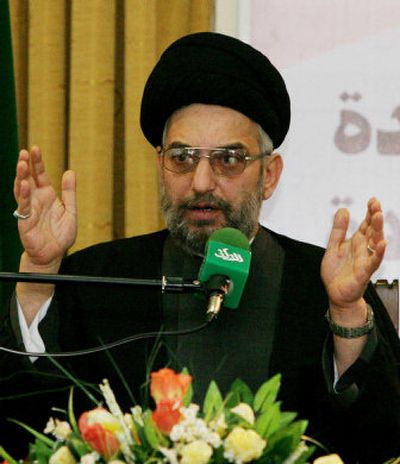Top Iraqi accuses U.S. of ‘interference’

BAGHDAD, Iraq – The leader of Iraq’s most powerful political party has called on the United States to let Iraqi fighters take a more aggressive role against insurgents, saying his country will only be able to defeat the insurgency when the United States lets Iraqis get tough.
“The more freedom given to Iraqis, the more chance for further progress there would be, particularly in fighting terror,” said Abdul Aziz al-Hakim, head of the Supreme Council for the Islamic Revolution in Iraq, the Shiite Muslim religious party that leads the transitional government and whose armed wing is the most feared of Iraq’s many factional forces.
Instead, al-Hakim asserted in a rare interview late last week, the United States is tying Iraq’s hands in the fight against insurgents. One of Iraq’s “biggest problems is the mistaken or wrong policies practiced by the Americans,” he said.
In more than an hour of conversation at his Baghdad home and office, al-Hakim denied accusations that the Shiite-led government’s security forces – with alleged involvement by his party’s armed wing – have operated torture centers and death squads targeting Sunni Arabs. He renewed his call to merge half of Iraq’s 18 provinces into a federal region in the oil-rich, heavily Shiite south, and he played down Iran’s interests in Iraq, saying Iran’s Shiite theocracy wants only what the United States claims to want: a stable Iraq.
During much of the interview, al-Hakim was critical of U.S. policies toward Iraq, though he acknowledged U.S. forces must remain in the country as a “guest” of the Iraqi government while it builds its security forces. The Americans are guilty of “major interference, and preventing the forces of the Interior or Defense ministries from carrying out tasks they are capable of doing, and also in the way they are dealing with the terrorists,” al-Hakim charged.
Al-Hakim gave few details of what getting tough Iraq’s way would entail, other than making clear it would require more weapons, with more firepower, than the United States is currently supplying. He also urged the United States to take a tougher stand against countries harboring insurgents and their supporters, and called for faster trials of insurgent suspects.
With Iraqis scheduled to vote Dec. 15 for the country’s first full-term government since the U.S. invasion in 2003, some analysts predict al-Hakim will come from behind the scenes into direct political contention.
Until now, al-Hakim has opted not to hold office; the highest-ranking member of the Supreme Council in the current government is Adil Abdul Mehdi, one of Iraq’s two vice presidents. But as head of the Supreme Council, which was founded by exiles in Iran as an armed Shiite opposition group to Saddam Hussein, al-Hakim commands the largest bloc of seats in Iraq’s transitional parliament.
In addition, al-Hakim oversees the party’s armed wing, formerly known as the Badr Brigade. Its fighters are widely feared for what even many Iraqi Shiites say are habits of torture and other ruthless tactics learned from Iranian intelligence and security forces. Now officially converted into a private security detail and political group, the renamed Badr Organization is widely alleged to control many command-level and rank-and-file officers in the Interior Ministry – police, commandos, intelligence agencies and other branches.
Sitting straight and intently in a high-backed chair, al-Hakim repeatedly invoked the assassination of his brother, Ayatollah Mohammed Bakir al-Hakim, who was killed by a car bomb in Najaf in August 2003. He evinced distrust of the United States even more often.
In Iraq, “there are plans to confront terrorists, approved by security agencies, but the Americans reject that,” al-Hakim said. “Because of that mistaken policy, we have lost a lot. One of the victims was my brother Mohammad Bakir, because of American policies.”
“For instance, the ministries of Interior and Defense want to carry out some operations to clean out some areas” in Baghdad and around the country, including volatile Anbar province, in the west, he said.
“There were plans that should have been implemented months ago, but American officials and forces rejected them,” he said. “This has led to the expansion of terrorism.”
“We have a capacity to move more quickly than currently,” he said.
Al-Hakim charged that the United States, evidently fearful of alienating Sunnis, was blocking the arrests of Sunni political leaders who had ties to insurgents. “The mixing of security and political issues” was just another U.S. mistake, he said. “Terrorists should know there would be no dealing with them.”